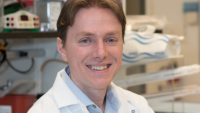Alberto Ciccia, PhD
- Professor of Genetics and Development

Overview
Alberto Ciccia is a Professor in the Department of Genetics and Development and the Herbert Irving Comprehensive Cancer Center. Dr. Ciccia earned his Ph.D. from the University College London and the London Research Institute, where he worked in the laboratory of Dr. Stephen West. In 2007, he joined the laboratory of Dr. Stephen Elledge at Harvard Medical School as a postdoctoral fellow. In 2014, Dr. Ciccia was appointed Assistant Professor at Columbia University Irving Medical Center, and in 2020, he was promoted to Associate Professor with tenure. In 2025, Dr. Ciccia was promoted to Professor.
Dr. Ciccia's research focuses on understanding the mechanisms by which the DNA damage response (DDR) operates to maintain genome integrity and prevent the onset of human disease. The DDR plays a pivotal role in human physiology, and mutations in DDR genes contribute to over 40 genetic disorders affecting the development of nervous, reproductive, and immune systems, predisposing individuals to premature aging and cancer (Ciccia and Elledge, Mol Cell, 2010). The Ciccia laboratory pursues four main lines of research related to the DDR:
1. Identification and Characterization of DDR Factors
During previous studies, Dr. Ciccia identified and characterized five novel DNA repair factors — the endonucleases EME1 and EME2, the Fanconi anemia protein FAAP24, the DNA translocases SMARCAL1 and ZRANB3. More recently, the lab discovered a new DDR factor, MCM8IP (also known as HROB), as an interactor of the MCM8-9 helicase that promotes genome stability in response to DNA damage (Huang et al, Nat Commun, 2020).
2. Elucidation of the Tumor Suppressor Activities of DDR Factors and Identification of Vulnerabilities of DDR-Deficient Tumors
The Ciccia laboratory investigates how BRCA1 and BRCA2 suppress breast and ovarian cancer. Studies of the lab revealed that SMARCAL1 and ZRANB3 promote genome instability in BRCA1- and BRCA2-deficient cells by inducing the degradation of nascent DNA at stalled replication forks (Taglialatela et al, Mol Cell, 2017). Additionally, the lab discovered that BRCA1/2-deficient tumor cells accumulate ssDNA gaps during DNA replication, and that inhibiting gap repair mediated by the REV1-Polζ translesion polymerase complex proves selectively toxic towards these tumor cells (Taglialatela et al, Mol Cell, 2021), suggesting a potential novel therapeutic strategy for BRCA1/2-mutant tumors.
3. Definition of the Role of Genome Instability in Anti-Tumor Immunity
The lab explores how genome instability triggers cancer-intrinsic innate immune responses, while inducing the expression of immune checkpoint regulators, such as PD-L1, which promote tumor immune evasion. Recent work of the lab identified DDR genes, including SMARCAL1, whose loss enhances innate immune signaling while concurrently reducing, rather than upregulating, PD-L1 expression, making SMARCAL1 a potential target for cancer immunotherapy (Leuzzi et al, Cell, 2024).
4. Development of Approaches for Precision Genome Editing and Study of Nucleotide Variants
The Ciccia laboratory has developed innovative precision genome editing methods, including iSTOP, a CRISPR-mediated base editing approach for inserting STOP codons and disrupting genes without double-strand breaks (Billon et al, Mol Cell, 2017). This technique has been utilized in the clinic for engineering T cells and treating patients with T cell acute lymphoblastic leukemia (Chiesa et al, NEJM, 2023). The lab has also developed methods for quantifying base changes (Billon et al, Cell Reports, 2020), enhancing precision genome editing efficiency (Nambiar et al, Nat Commun, 2019), and conducting base editing pooled screens to study nucleotide variants on a high-throughput scale (Cuella-Martin et al, Cell, 2021). These screens have led to the identification of function-altering mutations and clinically relevant variants in DDR genes.
Dr. Ciccia's comprehensive research spans diverse aspects of the DDR, shedding light on fundamental mechanisms and potential therapeutic targets in the context of cancer and genetic disorders. Additional information about projects conducted in the Ciccia laboratory can be found at http://www.ciccialab.com
Academic Appointments
- Professor of Genetics and Development
Credentials & Experience
Education & Training
- PhD, University College London
- Fellowship: Harvard Medical School
Honors & Awards
2008 - EMBO Long-Term Fellowship
2015 - Breast Cancer Alliance Young Investigator Award
2016 - Ovarian Cancer Research Fund Liz Tilberis Award
2016 - Susan G. Komen Career Catalyst Research Award
2018 - Schaefer Research Scholar Award
2018 - Irma T. Hirschl Award
2018 - Pershing Square Sohn Prize
2023 - CRI Lloyd J. Old STAR Award
Research
Research Interests
- Anti-tumor Immunity
- Breast Cancer
- Functional Genomics
- Genome Editing
- Maintenance of Genome Stability
- Ovarian Cancer
Selected Publications
1. SMARCAL1 is a dual regulator of innate immune signaling and PD-L1 expression that promotes tumor immune evasion. Leuzzi, G., Vasciaveo, A., Taglialatela, A., Chen, X., Firestone, T.M., Hickman, A.R., Mao, W., Thakar, T., Vaitsiankova, A., Huang, J.W., Cuella-Martin, R., Hayward, S.B., Kesner, J.S., Ghasemzadeh, A., Nambiar, T.S., Ho, P., Rialdi, A., Hebrard, M., Li, Y., Gao, J., Gopinath, S., Adeleke, O.A., Venters, B., Drake, C.G., Baer, R., Izar, B., Guccione, E., Keogh, M.C., Guerois, R., Sun, L., Lu, C., Califano, A., and Ciccia, A. (2024). Cell, 187: 1-21.
2. CRISPR-based genome editing through the lens of DNA repair. Nambiar, T.S., Baudrier, L., Billon, P., and Ciccia, A. (2022). Mol. Cell 82(2), 348-388
3. Towards a CRISPeR understanding of homologous recombination with high-throughput functional genomics. Hayward, S.B., and Ciccia, A. (2021). Curr. Opin. Genet. Dev. 71, 171-181.
4. REV1-Polζ maintains the viability of homologous recombination-deficient cancer cells through mutagenic repair of PRIMPOL-dependent ssDNA gaps. Taglialatela, A., Leuzzi, G., Sannino, V., Cuella-Martin, R., Huang, J.W., Wu-Baer, F., Baer, R., Costanzo, V., and Ciccia, A. (2021). Mol. Cell 81(19), 4008-4025.
5. Functional interrogation of DNA damage response variants with base editing screens. Cuella-Martin, R., Hayward, S.B., Fan, X., Chen, X., Huang, J.W., Taglialatela, A., Leuzzi, G., Zhao, J., Rabadan, R., Lu, C., Shen, Y., and Ciccia, A. (2021). Cell, 184(4), 1081-1097.
6. MCM8IP activates the MCM8-9 helicase to promote DNA synthesis and homologous recombination upon DNA damage. Huang, J.W., Acharya, A., Taglialatela, A., Nambiar, T.S., Cuella-Martin, R., Leuzzi, G., Hayward, S.B., Joseph, S.A., Brunette, G.J., Anand, R., Soni, R.K., Clark, N.L., Bernstein, K.A., Cejka, P., and Ciccia, A. (2020). Nature Comm.,11, 2948
7. Stimulation of CRISPR-mediated homology-directed repair by an engineered RAD18 variant. Nambiar, T.S., Billon, P., Diedenhofen, G., Hayward, S.B., Taglialatela, A., Cai, K., Huang, J.W., Leuzzi, G Cuella-Martin, R., Palacios, A., Gupta, A., Egli, D., and Ciccia, A. (2019). Nature Comm. 10, 3395.
8. The BRCT domains of the BRCA1 and BARD1 tumor suppressors differentially regulate homology-directed repair and stalled fork protection. Billing, D., Horiguchi, M., Wu-Baer, F., Taglialatela, A., Leuzzi, G., Alvarez, S., Jiang, W., Zha, S., Szabolcs, M., Lin, C.-S., Ciccia, A., and Baer, R. (2018). Mol. Cell 72(1), 127-139.
9. Restoration of replication fork stability in BRCA1- and BRCA2-deficient cells by inactivation of SNF2-family fork remodelers. Taglialatela, A., Alvarez, S., Leuzzi, G., Sannino, V., Ranjha, L., Huang, J.W., Madubata, C., Anand, R., Levy, B., Rabadan, R., Cejka, P., Costanzo, V., and Ciccia, A. (2017). Mol. Cell 68(2), 414-430.
10. CRISPR-mediated base editing enables efficient disruption of eukaryotic genes through induction of STOP codons. Billon, P., Bryant, E.E., Joseph, S.A., Nambiar, T.S., Hayward, S.B., Rothstein, R., Ciccia, A. (2017). Mol. Cell 67(6), 1068-1079.
11. Replication fork slowing and reversal upon DNA damage require PCNA polyubiquitination and ZRANB3 DNA translocase activity. Vujanovic, M., Krietsch, J., Raso, M.C., Terraneo, N., Zellweger, R., Schmid, J.A., Taglialatela, A., Huang, J.W., Holland, C.L., Zwicky, K., Herrador, R., Jacobs, H., Cortez, D., Ciccia, A., Penengo, L., Lopes, M. (2017). Mol. Cell 67(5), 882-890.
12. SMARCAL1-mediated fork reversal triggers MRE11-dependent degradation of nascent DNA in the absence of BRCA2 and stable RAD51 nucleofilaments. Kolinjivadi, A.M., Sannino, V., De Antoni, A., Zadorozhny, K., Kilkenny, M., Techer, H., Baldi, G., Shen, R., Ciccia, A., Pellegrini, L., Krejci, L., Costanzo, V. (2017). Mol. Cell 67(5), 867-881.
13. Stressing out about RAD52. Ciccia, A.* and Symington, L.S.* (2016). Mol. Cell 64(6), 1017-1019. *Corresponding authors
14. Treacher Collins syndrome TCOF1 protein cooperates with NBS1 in the DNA damage response. Ciccia, A.*, Huang, J.W., Izhar, L., Sowa, M.E., Harper, J.W., and Elledge, S.J.* (2014). Proc. Natl. Acad. Sci U S A 111, 18631-18636. *Corresponding authors
15. Polyubiquitinated PCNA recruits the ZRANB3 translocase to maintain genomic integrity after replication stress. Ciccia, A., Nimonkar, A.V., Hu, Y., Hajdu, I., Achar, Y.J., Izhar, L., Petit, S.A., Adamson, B., Yoon, J.C., Kowalczykowski, S.C., Livingston, D.M., Haracska, L., and Elledge, S.J. (2012). Mol. Cell 47(3), 396-409.
16. The DNA damage response: making it safe to play with knives. Ciccia, A., and Elledge, S.J. (2010). Mol. Cell 40(2) 179-204.
17. The SIOD disorder protein SMARCAL1 is an RPA-interacting protein involved in replication fork restart.Ciccia, A., Bredemeyer, A.L., Sowa, M.E., Terret, M.E., Jallepalli, P.V., Harper, J.W., and Elledge, S.J. (2009). Genes Dev. 23(20),
For a complete list of publications, please visit PubMed.gov

